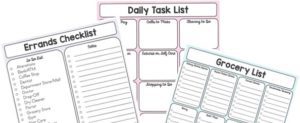
“For every minute spent organizing, an hour is earned.”
Benjamin Franklin
I don’t know how accurate the quote is, but I do know that working in an organized space saves time and it saves stress. You can work more efficiently and with less distractions surrounding you. I like to be able to find anything I need in 30 seconds or less.
When I present on productivity issues, I share a statistic that 30% of all employees’ time is spent trying to find lost documents. That is 2.4 hours/day.
If you are proprietor making $50/hour and you lose 2 hours per day, that equals $24,000.
I believe that isn’t just looking for things due to disorganization, but also about having poor work habits, dealing with interruptions and not staying focused on high value activities.
Visualize a Cluttered Office
You work from your home office so you get out of bed, go make a cup of coffee, enter your office and sit down at your computer to check email.
Before you can sit down, you have to move a stack of files from your chair. There’s not a clear spot on your desk, so you put the files on the floor. As you put the files on the floor, you see banker’s boxes of old files and even old mail, causing you to sigh.
You turn to your computer, but you feel distracted by the things on your desk. Three overflowing pencil cups, stacks of files and stacks of paper to process, yesterday’s project, a box of Kleenex, a bottle of Tylenol and your personal mail are all staring back at you. You sigh again and feel tired before the day has even started, despite your hot cup of coffee.
Visualize an Organized Office
You work from your home office so you get out of bed, go make a cup of coffee, enter your office and sit down at your computer to check email.
You turn on your lamp and sit down in the comfy new chair that you recently purchased. Before you check your email, you see that you have some paper to process in your inbox, so your focus goes there first.
You open each item and either recycle it, shred it, put it in your “Action System” or file it. You then turn your attention to your inbox to process your email.
Once that’s done, it’s on to the to do list that you created at the end of the day yesterday.
The day is off to a great start and your coffee is delicious.
Eight Organizing Tools
These area items that I believe every organized office should have for structure and to work productively.
- A comfortable chair at the correct height.
- Good lighting so you can see your work clearly.
- A good calendar system that is easy for you to use. Are you a paper person or a digital person?
- A label maker to create clear, crisp labels for files and storage bins.
- A recycle bin so you can get rid of paper that you don’t need on the spot. Make quick decisions and let it go.
- A shredder to destroy sensitive information right away. Fellowes is a good brand and what I use in my own home office.
- An inbox tray or basket to temporarily hold papers until you’re ready to process them.
- A tray on top of your filing cabinet to temporarily store papers until you’re ready to file them in a filing cabinet or file box.
Four Essential Paper Systems
- Action system: papers that require action, your ‘to do’s or forms. This may look like a file box or stacking trays.
- Filing System: paper that you need to keep for future reference or as a resource. This will look like a filing cabinet or a file box.
- Archive Files: paper you are required to keep for legal reasons, store further away and out of your prime real estate.
- Sensitive storage: fireproof safe or safe deposit box to store your vital documents.
Paper Flow
This is a simple way to think about your paper flow:
- The paper comes in and you place it in your inbox temporarily.
- When you’re ready, you process it by opening what you have in front of you.
- Then place each item in the correct bucket. This could be in the recycle bin, shredder, Action System or your file cabinet.
Action Item:
Look around your office today with a fresh set of eyes and identify the problem areas where you feel you need to make improvements. Be sure to also acknowledge the things that are working well.
“With organization comes empowerment.” Lynda Peterson



